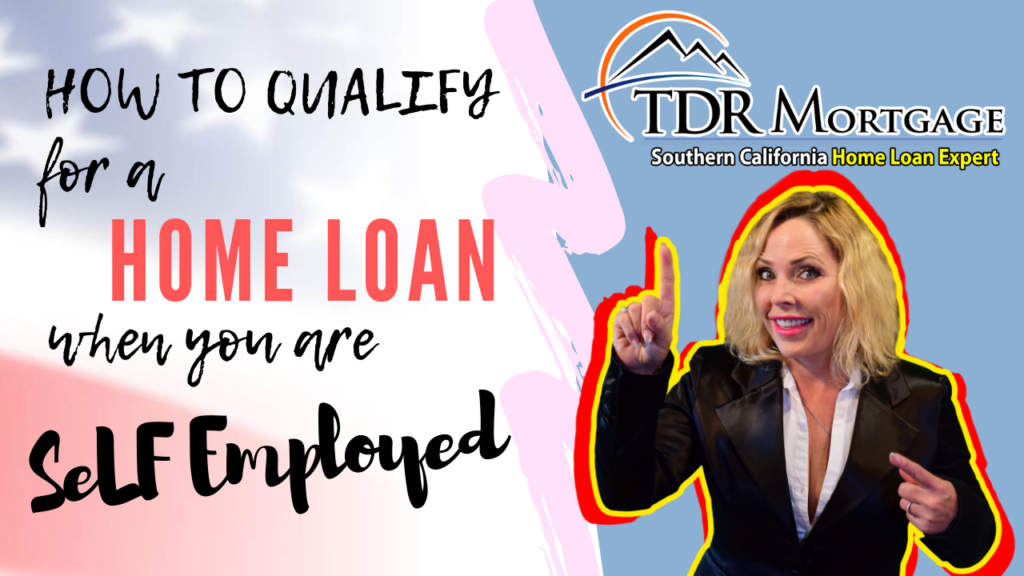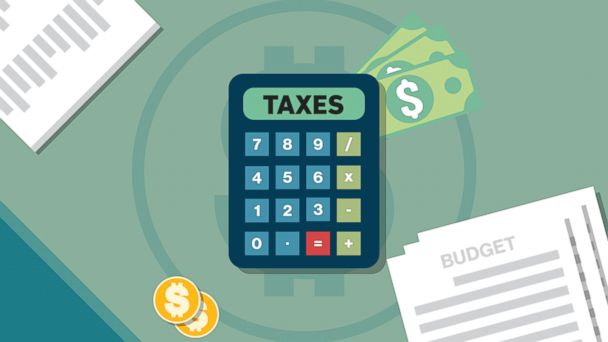How to Qualify for a Home Loan When You Are Self Employed and File a Schedule C on Your Fed Form 1040’s
 Home Loan Expert, Teresa Tims, http://TheSoCalLoanPro discusses what lenders look for when analyzing your income when you are looking to purchase or refinance a residential home. Teresa emphasizes how important it is to work with someone experienced and understands the guidelines on How to Qualify for a home loan when you are Self Employed. But more importantly, someone that can get things done, PUSH for you and make things happen.
Home Loan Expert, Teresa Tims, http://TheSoCalLoanPro discusses what lenders look for when analyzing your income when you are looking to purchase or refinance a residential home. Teresa emphasizes how important it is to work with someone experienced and understands the guidelines on How to Qualify for a home loan when you are Self Employed. But more importantly, someone that can get things done, PUSH for you and make things happen.
She will talk about the following;
Schedule C Income Qualifying for a home loan- Why do they use the Net?
Tips to qualify for a home loan when you are self-employed.
Can you re-file your taxes in California to qualify for a home loan?
- What’s the process
- How long does it take
- Should I prepare now
Let’s get started, today I’m going to discuss how to qualify for a Schedule C home loan if you are self-employed. The definition of self-employed for this video is someone that is filing a Schedule C on their Federal Form 1040, they receive checks from individuals, or they get a 1099. Okay, why can’t I turn that down?
So welcome everybody. How are you? Happy Friday. My name is Teresa Tims, I am President of TDR Mortgage and Real Estate Group in Upland, California. I specialize in mortgages and partner with all kinds of really, really great real estate agents and real estate folks. If you’re looking to buy and sell in Southern California, pass along my name because that would mean so much to me.
Schedule C Income Qualifying for a home loan – Why do they use the Net?
Okay, let’s get started. Probably one of the biggest frustrations that consumers experience in the home financing sector is when they go talk to a loan officer, like myself, and they find out they don’t qualify because there’s a disconnect from, “Hey, I made $100,000 last year, and you can see it on my Schedule C. See, right there, it says $100,000.” And I say, “Yeah, okay, I get it, you made $100,000. However, being a self-employed person, you’re not paying FICA, you’re not paying any federal taxes, state taxes, you’re not paying any of that, so all of that money is going to you.”
Then when you go sit down with your tax gal or guy, you have auto expense, you have office expense, maybe you pay other people, you have mileage. You just have all these expenses. So you’re showing $100,000, but Jeffrey, you wrote off $75,000, so your bottom, your adjusted gross income is only $25,000, so you and I both know that isn’t even going to get you a mobile home in Barstow right now. I don’t … Yeah, no. You’re not going to purchase a home in this market.
If you are in a situation where you’re earning income and you want to qualify for a home loan, the first thing that you should do is get in touch with a trusted mortgage professional. Hopefully that would be me, but if not, go to your bank or your credit union. Have them take a look at your taxes and have them tell you what you need to do. You know what they’re going to tell you? They’re simply going to tell you you don’t qualify.

At TDR Mortgage, we do things a little bit differently. We’re a more hands-on approach to income and assisting people in purchasing homes in California. We would have a consultation where we evaluate your taxes, and you say, “Hey Teresa, I want to buy a $500,000 house.” Then I’m going to say, “Okay, well in order to buy that house, you need to make $100,000.”
So we’ll use the same example. Jeffrey, he showed $100,000 on his taxes, but he wrote everything off. Well in order to qualify for that house, you need to show $100,000. So next year, when you get ready to file your taxes, you’re going to … Yeah, get ready to file your taxes, you’re going to have to pay income tax on that income. And that’s really the catch 22 for self-employed persons is it’s really great to get that income, getting that tax free, I’m in the same boat, but then at the end of the year, to be able to save enough money so that you can pay your taxes. That’s why the stated loans were so popular with self-employed people back before the crash.
So I have got some tips for you because I am all about solutions and lending, and I have been doing originating home loans since 1998. I pride myself on being a technician on guidelines, and basically doing helping people. Doing what’s best for you, not what’s best for me. And that’s one of our mottos here at TDR Mortgage is that sometimes it’s a little bit harder to do something that’s in the best interest of the client, but no matter what, that’s always at the top of our list.
Tips to qualify

Okay, tips to qualify. So the Schedule C self-employed borrower, it is so simple. It’s so simple. Gross income is your total income that you earn.`Adjusted gross or net is basically your bottom line dollar that you’re paying taxes on with the IRS. If you’re qualifying for a home loan, you have to figure out the sweet spot in showing enough income to qualify. Not having to pay the full net on your taxes, which that can be kind of tricky. If you need help in evaluating that, we would have to get together and look at two years of your taxes and evaluate how we can make that happen.
The one tip that I could tell you is that you need to have somebody look at your Schedule C. There’s no way around reporting income and taking deductions and being able to qualify. It’s so, so simple, and cut and dry. So let’s just say, this is a perfect time for this video because your self-employed. You’re going along this year, you’re making your money. We’ll use this example, last year, you made $100,000, you wrote off $75. Last year, you showed $25,000 income.
In order to buy a house next year, we would need to get together so that we could discuss with you that you really need, if you want to buy a house, you really have to pay this much, you have to show this much income, and you have to pay taxes on that. That’s a hard pill to swallow for a lot of self-employed people, and that’s why when they get to us they’re so frustrated. Let’s face it, people just don’t have $10,000 or $20,000 laying around to go pay their taxes. When you’re self-employed you need to set a little bit aside, or you’re just going to have to put a big chunk down. Then they have to do some kind of bank statement loan or some of their alternative financing type loans.
In Schedule C, to qualify for a home loan you need to be self-employed for two years. Not a year and a half, not one point seven five years. It has to be two years.
There are some underwriting engines when we run them through. There’s Fannie May and Freddie Mac. Depending on the results from the automated underwriting engines, called AUS systems, these systems will generate findings. Based on a set of variables; off of your cash, your credit, and your income, it will come back and tell us we need a limited amount of documentation. Sometimes it will come back and say we just need one year of taxes. If that’s the case, then all we’re going to do is show one year of your 1040’s. As long as we can show that you have been in business for the last ten years, that falls within the guidelines of qualifying, and you’re going to be in like Flynn. You’re going to be a homeowner.
So if you’ve been looking to purchase or to find out how you go about it, really the first thing to put in motion is to speak to a lender to figure out how you’re going to put all this stuff together.
Can you re-file your taxes
 Let me see. What else? What else? In the past, I’ve seen people go back and they refile their taxes. So, “Hey, I want to buy a house so bad, I don’t care if I have to pay more money to the IRS.” I can tell you who does not care about this is the IRS. Oh no, you’re going to go back and refile your taxes to qualify for a home loan and they’re like this, “Oh great, we’re going to make $10,000.” So that’s one strategy, you go back and refile your taxes. However, I have known people that have done that, and they can’t qualify. Just because you file your taxes doesn’t mean that we can use them, they have to be validated. This means you file your taxes, they go through the system. Then the lenders do something called a 4506 income request.
Let me see. What else? What else? In the past, I’ve seen people go back and they refile their taxes. So, “Hey, I want to buy a house so bad, I don’t care if I have to pay more money to the IRS.” I can tell you who does not care about this is the IRS. Oh no, you’re going to go back and refile your taxes to qualify for a home loan and they’re like this, “Oh great, we’re going to make $10,000.” So that’s one strategy, you go back and refile your taxes. However, I have known people that have done that, and they can’t qualify. Just because you file your taxes doesn’t mean that we can use them, they have to be validated. This means you file your taxes, they go through the system. Then the lenders do something called a 4506 income request.
We send a form to the IRS and we double check what you reported. We validate the income you reported to the IRS. Until we can validate that income, we technically can’t use it. So in order to get you to qualify, a lot of times you’ll have to wait. I’ve had people wait as little as two weeks, four weeks, six weeks, that’s about the norm. Usually what I see is that when the IRS cashes. Your check about a week later we can validate that income. That’s probably about one of the biggest tricks that I know that I’ve used before. Other people have used this before, is to go back and refile your taxes to qualify. Nobody has a problem with that, because like I said, the IRS wants to make more money.
 Should I prepare now? Give our office a call, we can figure out how we can best help you. If you or someone you know is interested in purchasing a home or refinancing. Pick up that phone and give me a call at 909-920-3500.
Should I prepare now? Give our office a call, we can figure out how we can best help you. If you or someone you know is interested in purchasing a home or refinancing. Pick up that phone and give me a call at 909-920-3500.


 Teresa Tims is President of TDR Mortgage in Charming Downtown Upland CA. She prides herself in offering quality home loan products, competitive pricing and knowledgeable assistance when helping her clients select a home loan. Teresa is a life-long resident of the Inland Empire.
Teresa Tims is President of TDR Mortgage in Charming Downtown Upland CA. She prides herself in offering quality home loan products, competitive pricing and knowledgeable assistance when helping her clients select a home loan. Teresa is a life-long resident of the Inland Empire.